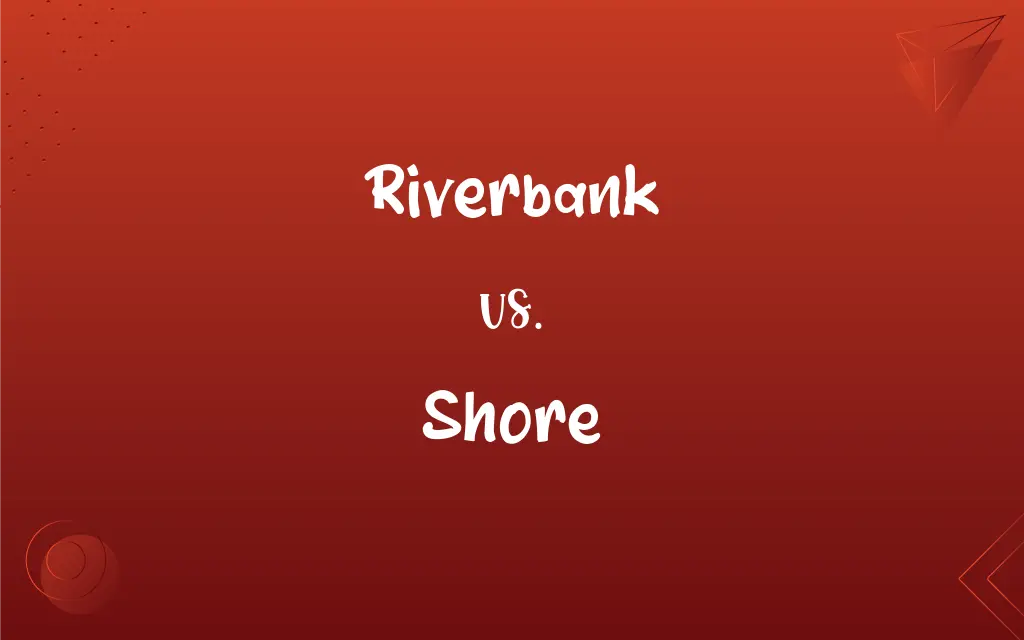Riverbank vs. Shore: What's the Difference?
By Harlon Moss || Updated on May 23, 2024
A riverbank is the land alongside a river, while a shore is the land along the edge of any large body of water, such as a sea, lake, or ocean.

Key Differences
A riverbank refers specifically to the land alongside a river. It includes both sides of the river, often characterized by vegetation and soil that can support riverine ecosystems. A shore, on the other hand, is the land along the edge of any large body of water, such as a sea, lake, or ocean. Shores can vary greatly in their features, including sandy beaches, rocky coastlines, or muddy flats.
While riverbanks are limited to rivers, shores can be found along oceans, seas, lakes, and large rivers, making the term more versatile. Riverbanks are typically narrower and defined by the flowing water of rivers, whereas shores can extend more broadly and are influenced by tides, waves, and broader climatic conditions.
Both riverbanks and shores are important for their respective ecosystems, providing habitats for various plant and animal species. However, they differ in their geographical settings and the types of water bodies they border.
Comparison Chart
Definition
Land alongside a river
Land along the edge of a large body of water
Water Body Type
River
Sea, ocean, lake, or large river
ADVERTISEMENT
Characteristics
Vegetation, soil, narrow
Sandy, rocky, muddy, broad
Ecosystem Role
Prevents erosion, supports riverine life
Supports coastal ecosystems
Scope
Specific to rivers
Broad, includes various water bodies
Riverbank and Shore Definitions
Riverbank
Edge of a river, often vegetated.
The riverbank was lined with willow trees.
Shore
Area where water meets land.
We built a sandcastle on the shore.
ADVERTISEMENT
Riverbank
Area prone to erosion from river flow.
Efforts were made to stabilize the eroding riverbank.
Shore
Habitat for coastal and marine species.
The shore is home to many different types of seabirds.
Riverbank
Natural habitat for riverine species.
Otters can often be seen playing along the riverbank.
Shore
The land along the edge of a sea, lake, or ocean.
They spent the afternoon collecting shells on the shore.
Riverbank
The land alongside a river.
We walked along the riverbank, enjoying the lush greenery.
Shore
Land adjacent to a large water body.
The resort is located on the Mediterranean shore.
Riverbank
Land adjacent to a river channel.
The fisherman sat quietly on the riverbank, waiting for a bite.
Shore
The land along the edge of an ocean, sea, lake, or river; a coast.
Riverbank
The bank of a river.
Shore
Often shores Land; country
Far from our native shores.
Riverbank
A sloped side of a river acting as a barrier between the water and level ground to either side.
Shore
Land as opposed to water
A sailor with an assignment on shore.
Riverbank
The bank of a river
Shore
A beam or timber propped against a structure to provide support.
Shore
To support by or as if by a prop
Shored up the sagging floors.
Shored up the peace initiative.
Shore
A past tense of shear.
Shore
Land adjoining a non-flowing body of water, such as an ocean, lake or pond.
Shore
(from the perspective of one on a body of water) Land, usually near a port.
The seamen were serving on shore instead of in ships.
The passengers signed up for shore tours.
Shore
A prop or strut supporting some structure or weight above it.
The shores stayed upright during the earthquake.
Shore
(obsolete) To set on shore.
Shore
Not followed by up: to provide (something) with support.
Shore
Usually followed by up: to reinforce (something at risk of failure).
My family shored me up after I failed the GED.
The workers were shoring up the dock after part of it fell into the water.
Shore
To threaten or warn (someone).
Shore
To offer (someone).
Shore
A sewer.
Shore
A prop, as a timber, placed as a brace or support against the side of a building or other structure; a prop placed beneath anything, as a beam, to prevent it from sinking or sagging.
Shore
The coast or land adjacent to a large body of water, as an ocean, lake, or large river.
Michael Cassio,Lieutenant to the warlike Moor Othello,Is come shore.
The fruitful shore of muddy Nile.
Shore
To support by a shore or shores; to prop; - usually with up; as, to shore up a building.
Shore
To set on shore.
Shore
The land along the edge of a body of water
Shore
A beam or timber that is propped against a structure to provide support
Shore
Serve as a shore to;
The river was shored by trees
Shore
Arrive on shore;
The ship landed in Pearl Harbor
Shore
Support by placing against something solid or rigid;
Shore and buttress an old building
Shore
Coastal land, often sandy or rocky.
The waves crashed against the rocky shore.
FAQs
What type of water bodies have shores?
Shores are found along seas, oceans, lakes, and large rivers.
What defines a shore?
A shore is the land along the edge of a large body of water, such as a sea, lake, or ocean.
Can a riverbank be a shore?
Technically, yes, if the river is large enough, but typically the terms are used to describe different settings.
What is a riverbank?
A riverbank is the land alongside a river.
Are riverbanks and shores the same?
No, riverbanks are specific to rivers, while shores can be along any large water body.
What are common features of a riverbank?
Riverbanks often have vegetation, soil, and are prone to erosion.
What types of shores exist?
Shores can be sandy, rocky, or muddy, depending on the environment.
What activities are common on shores?
Activities like swimming, sunbathing, and beachcombing are common on shores.
Do shores support different ecosystems?
Yes, shores support coastal and marine ecosystems.
Can shores be eroded?
Yes, shores can experience erosion from waves and tides.
Can shores be inhabited?
Yes, shores often have human settlements, resorts, and recreational areas.
Why are riverbanks important?
Riverbanks help prevent erosion and support riverine ecosystems.
Is the term 'shore' used for rivers?
Rarely; 'shore' is more commonly used for larger bodies of water like seas, lakes, and oceans.
What activities are common along riverbanks?
Activities like fishing, walking, and picnicking are common along riverbanks.
Do riverbanks experience tides?
Generally, no; riverbanks experience river flow rather than tides.
Do shores experience tides?
Yes, shores can experience tides, especially those along seas and oceans.
What wildlife is common on riverbanks?
Wildlife such as otters, birds, and amphibians are common on riverbanks.
What wildlife is common on shores?
Wildlife such as seabirds, crabs, and marine mammals are common on shores.
Can a riverbank be rocky?
Yes, riverbanks can be rocky, though they are often vegetated.
Are riverbanks subject to flooding?
Yes, riverbanks can flood, especially during heavy rain or snowmelt.
About Author
Written by
Harlon MossHarlon is a seasoned quality moderator and accomplished content writer for Difference Wiki. An alumnus of the prestigious University of California, he earned his degree in Computer Science. Leveraging his academic background, Harlon brings a meticulous and informed perspective to his work, ensuring content accuracy and excellence.
































































